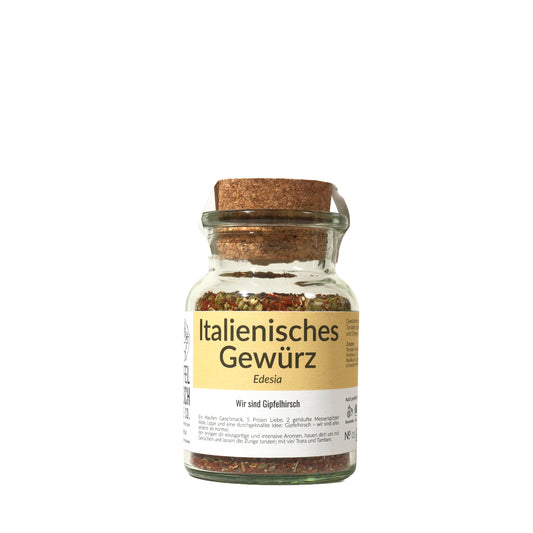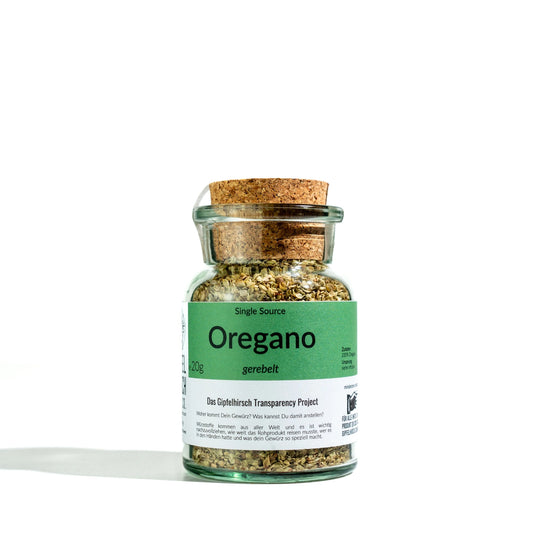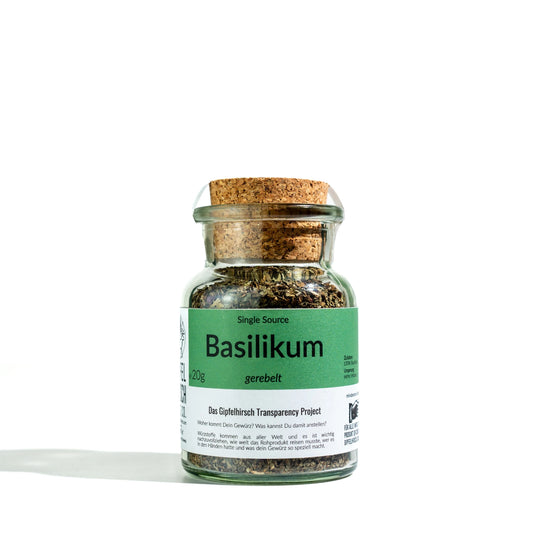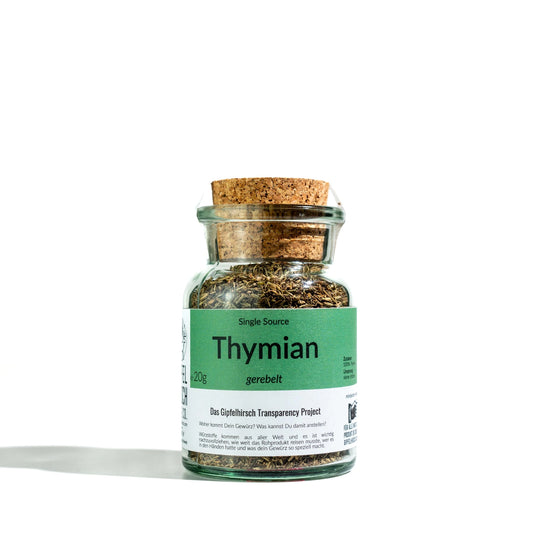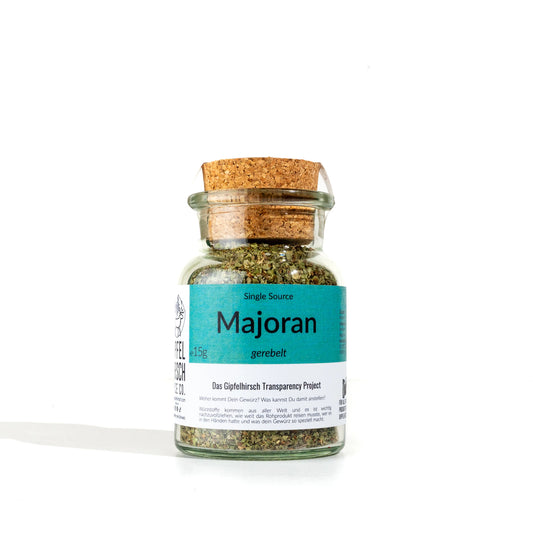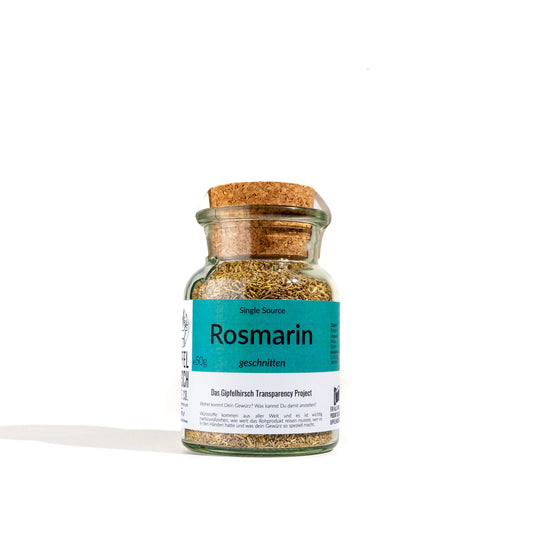Kategorie: Kräuter
-
Italienisches Gewürz Edesia
Normaler Preis CHF 10.00Normaler PreisGrundpreis entspricht CHF 20.00 / pro 100g -
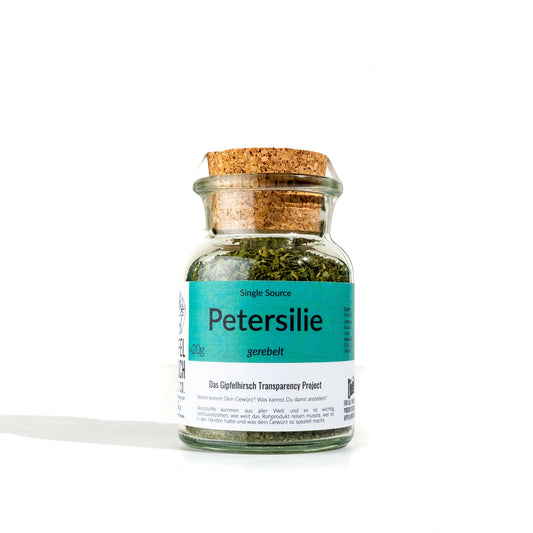 Ausverkauft
AusverkauftPetersilie
Normaler Preis CHF 6.50Normaler PreisGrundpreis entspricht CHF 32.50 / pro 100g -
Rosmarin, geschnitten
Normaler Preis CHF 6.50Normaler PreisGrundpreis entspricht CHF 13.00 / pro 100g
Die Welt der Kräuter
Kräuterwissen
Urspung und Historie von Kräutern
Alle unsere Kräuter haben eine interessante Historie, die Kontinente und Jahrhunderte umfasst. Basilikum, das in der hinduistischen Kultur verehrt wird, stammt aus Indien und wurde in vielen östlichen Traditionen als heilig angesehen. Es wird gesagt, dass Basilikum nach der Auferstehung um das Grab Christi wuchs, was zu seiner Assoziation mit Schutz und Glück führte. Oregano, der aus dem Mittelmeerraum stammt, ist ein Grundpfeiler der griechischen und italienischen Küche. Die Griechen glaubten, dass er von der Göttin Aphrodite erschaffen wurde, was ihn zu einem Symbol für Freude und Glück machte. Thymian, ein weiteres mediterranes Kraut, wurde im alten Ägypten aufgrund seiner konservierenden Eigenschaften für die Einbalsamierung verwendet und später von den Römern als Symbol für Mut übernommen. Majoran, der eng mit Oregano verwandt ist, stammt aus Zypern und der südlichen Türkei und wurde oft von den Griechen verwendet, um junge Paare als Symbol für Liebe und Ehre zu krönen. Petersilie, die aus dem zentralen Mittelmeerraum stammt, wurde im alten Rom so geschätzt, dass sie nicht nur als Nahrungsmittel, sondern auch als Symbol für Sieg und für medizinische Zwecke verwendet wurde. Rosmarin, ebenfalls aus dem Mittelmeerraum, war in der antiken griechischen und römischen Kultur ein Symbol für Erinnerung und Treue und wurde oft in Hochzeiten und Beerdigungen verwendet.
Geschmacksprofile und Kochen mit Kräutern
Alle Kräuter bringen ihren eigenen einzigartigen Geschmack in die Küche und verleihen einer Vielzahl von Gerichten Tiefe und Charakter. Basilikum, mit seinem süssen, pfeffrigen Geschmack und den subtilen Anisnoten, ist unverzichtbar in der italienischen Küche, besonders in Pesto und Caprese-Salaten. Oregano, bekannt für sein kräftiges, leicht bitteres und erdiges Profil, ist ein Muss für die Pizzawürzung und Marinaden, besonders in mediterranen Gerichten. Thymian, mit seinem subtilen, trockenen und leicht minzigen Geschmack, ist unglaublich vielseitig und verleiht allem von Suppen und Eintöpfen bis hin zu geröstetem Fleisch das gewisse Etwas. Majoran, ein süsserer und milderer Verwandter des Oreganos, fügt Wurstwaren, Füllungen und feinen Saucen eine blumige Note hinzu, was ihn ideal für nuancierte Gerichte macht. Petersilie, mit ihrem frischen, leicht bitteren und krautigen Geschmack, ist eine universelle Garnitur, die Salaten, Tabouleh und praktisch jedem Gericht, das eine Prise Frische benötigt, Helligkeit verleiht. Rosmarin, mit seinem holzigen, harzigen Geschmack und Zitronenanklängen, ist perfekt zum Braten von Fleisch, insbesondere Lamm, sowie für Kartoffeln und Brot.
Einzigartige Eigenschaften
Über ihren kulinarischen Reiz hinaus sind diese Kräuter vollgepackt mit nützlichen Eigenschaften, die sie nicht nur zu geschmackvollen Ergänzungen deiner Gerichte machen, sondern auch zu einem gesunden Ernährungsplan beitragen. Basilikum ist bekannt für seine entzündungshemmenden Eigenschaften und eignet sich hervorragend für alle, die auf natürliche Weise Entzündungen reduzieren möchten. Oregano ist reich an Antioxidantien und besitzt starke antibakterielle Eigenschaften, die das Immunsystem unterstützen können. Thymian wird wegen seiner antimikrobiellen Eigenschaften geschätzt und wird oft verwendet, um Atemwegserkrankungen zu lindern. Majoran wirkt verdauungsfördernd und hat beruhigende Effekte, was ihn zu einem grossartigen Kraut macht, wenn du dich entspannen möchtest. Petersilie ist aussergewöhnlich reich an Vitamin C, das das Immunsystem unterstützt und die Hautgesundheit fördert, während Rosmarin bekannt dafür ist, das Gedächtnis zu verbessern und die Verdauung zu fördern.
Lagerung und Verwendung deiner Lieblingskräuter
Um das Beste aus diesen Kräutern herauszuholen, ist es wichtig, sie richtig zu lagern. Bewahre sie an einem kühlen, trockenen und dunklen Ort auf, um ihre Frische zu erhalten. Wenn du eine Fülle an frischen Kräutern hast, solltest du überlegen, sie zu trocknen oder einzufrieren, um ihre Haltbarkeit zu verlängern, ohne Geschmack zu verlieren. Beim Kochen denk daran, dass getrocknete Kräuter konzentrierter sind als frische, daher musst du die Mengen entsprechend anpassen. Falls dir ein bestimmtes Kraut fehlt, können viele Kräuter durch andere ersetzt werden – wie Majoran statt Oregano oder Petersilie statt Basilikum – was dir Flexibilität und Kreativität in der Küche ermöglicht.

